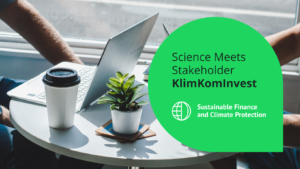Background of the event
“Sustainable Finance and Climate Protection” (SFCP) is the name of the BMBF’s accompanying project for the funding measure “Climate Protection and Finance” (KlimFi). In a dialog process, the fields of science, politics and finance are networked around the topic of climate protection and finance and findings from science are communicated to politics and finance. The VfU is responsible for the transfer of central results into practice in the financial sector and to other relevant stakeholder groups.
The Science Meets Stakeholder format aims to support the interface between research and financial industry practice and provides a platform for scientists to exchange ideas with stakeholders. Goals, questions, needs and ideas are to be shared. Thus, valuable feedback on the relevance and enhancement of the research work can be provided by the stakeholders.
Agenda
In this issue the project “Sustainable Financing of Municipal Climate Investments under Consideration of EU Taxonomy” (KlimKomInvest) is presented. This is intended to contribute to the fact that in the future public investments will be financed more strongly than today by sustainable forms of financing in the sense of the EU taxonomy. Although the EU taxonomy is not yet directly applicable to municipalities, this is to be expected in the future. Already today, for example, the EU ties the awarding of subsidies to the fulfillment of the taxonomy criteria. Banks are also under pressure, as from 2024 they will have to prove what proportion of their total portfolio is spent on sustainably financed, i.e. taxonomy-compliant, economic activities (“Green Asset Ratio”). The project will analyze the challenges for (German) municipalities in the practical application of the EU taxonomy and the German government’s Sustainable Finance Strategy and identify European and international best practice examples. Based on this, an optimal regulatory framework for municipalities of different sizes will be developed in a stakeholder dialog involving municipalities, public enterprises, development banks, state and municipal supervisory authorities. The overall aim of the project is to reduce the structural mismatch between supply and demand for sustainable forms of financing. Difu is conducting the project in cooperation with various state and development banks, KfW, the Association of Public Sector Banks (VÖB) and the Association of Municipal Enterprises (VKU).
In the Science Meets Stakeholder webinar, the first results of the KlimKomInvest project will be presented. These include findings from various interviews with financial market players on the particular challenges and conflicting objectives that the application and transfer of the EU taxonomy and the CSRD Directive would entail for the municipal financing business. On this basis, first policy recommendations are presented and – taking into account European experiences – derivations for a possible sustainability reporting system of municipalities and public enterprises are outlined.
Target group
The event is aimed at employees from financial institutions, auditing firms and rating agencies.
The researchers would welcome feedback from you on the following questions:
